Re-living Roger Federer's 7 Best Seasons
Re-living Roger Federer’s 7 Best Seasons
With 20 Grand Slam titles and 310 weeks at World No. 1 in the Pepperstone ATP Rankings, there is no doubt that Roger Federer is one of the greatest tennis players of all time. Across his nearly two decades at the top of the game, the Swiss maestro’s seemingly effortless style and dominance captivated fans and confounded opponents – as he rewrote the tennis record books many times over.
But which of Federer’s many seasons at the top would rank as the best of his career? Would it be 2004, 2006 or 2007, when he lifted three Grand Slam titles, or 2005 when he recorded the second-best winning percentage in the Open Era? What about 2009 when he completed the career Grand Slam at Roland Garros, or 2012 when he surpassed Pete Sampras for most weeks at World No. 1?
ATPTour.com breaks down seven of the best seasons of Federer’s legendary career, from his big breakout season to his major comeback year…
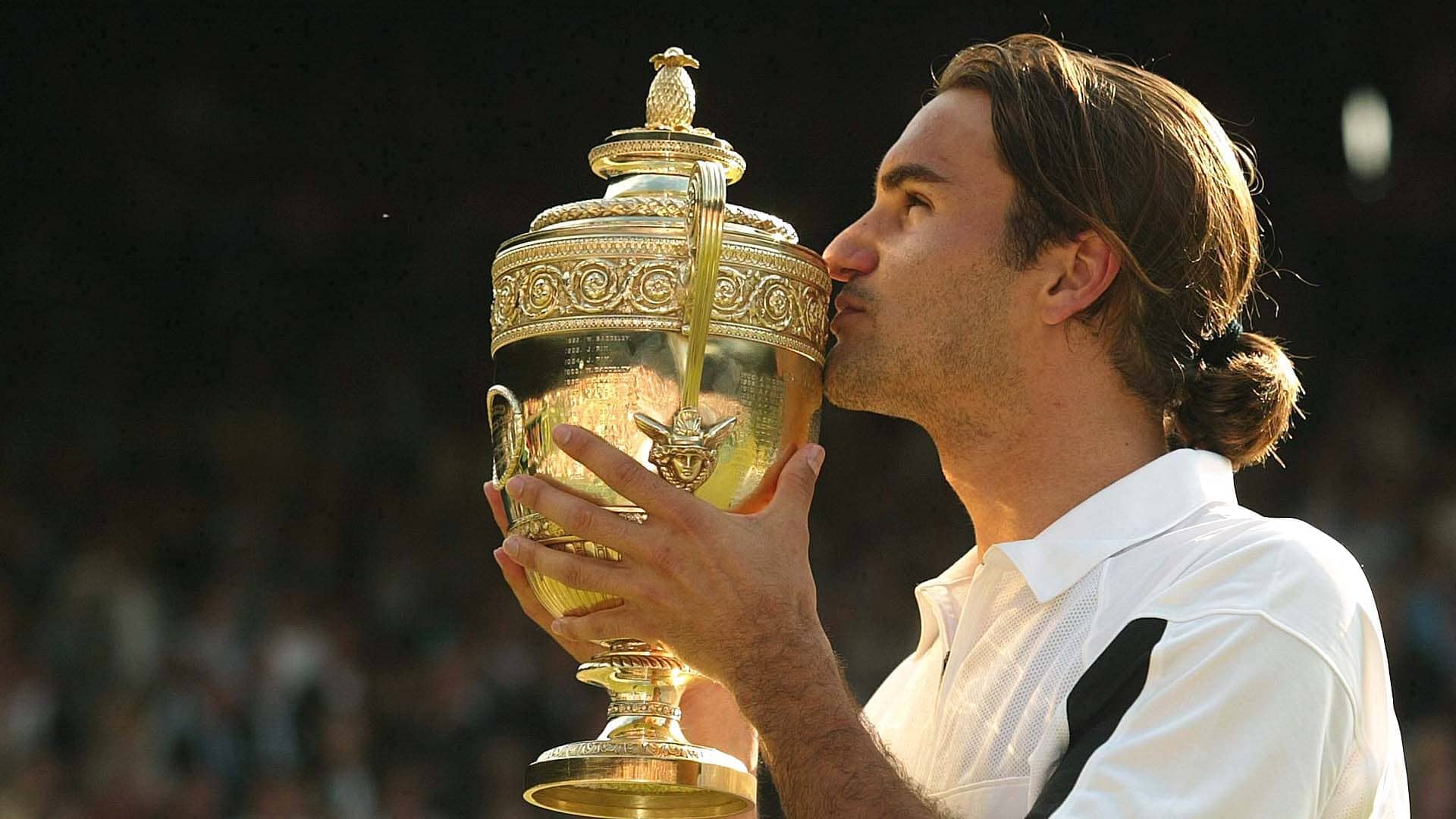
Roger Federer captures his second Wimbledon title in 2004. Photo by: Bongarts/Bongarts/Getty Images
2004
Win-Loss Record: 74-6 (92.5%)
Titles: 11
Grand Slam Titles: 3
After bursting onto the scene by winning Wimbledon, his first major title, in 2003, Federer reinforced his position as a force to be reckoned with just one season later. He became the first man to win three Grand Slam singles titles in the same year since Mats Wilander in 1998 as he captured trophies at the Australian Open (d. Safin), Wimbledon (d. Roddick) and the US Open (d. Hewitt).
The Swiss 22-year-old put together one of the most dominant seasons in the Open Era as he amassed a head-turning winning percentage of 93 (74-6) and rose to World No. 1 in the Pepperstone ATP Rankings for the first time (2 February). His trophy count totalled 11 by the time the year was done, and included a second Tennis Masters Cup crown [now Nitto ATP Finals].
“It’s still tough to believe because I think once I settle down, have some time off, at the end of the year especially, I’ll be looking back thinking, ‘How in the world did I do all this?’ Now, it’s just a little bit much,” Federer said after his win in New York.
Little did he know how much more was in store…
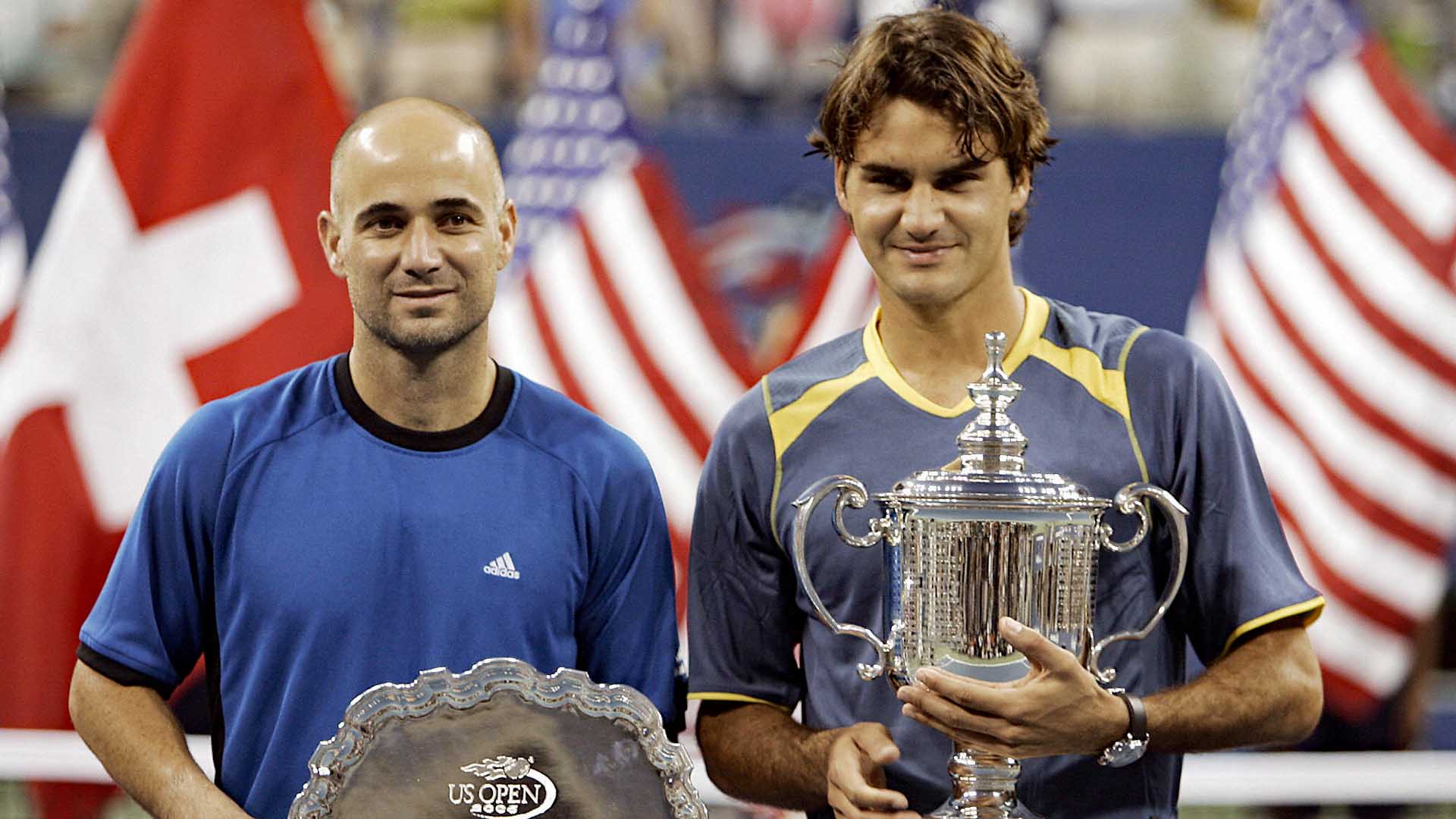
Andre Agassi fell victim to Federer in four sets in the 2005 US Open final. Photo by: TIMOTHY A. CLARY/AFP via Getty Images
2005
Win-Loss Record: 81-4 (95.29%)
Titles: 11
Grand Slam Titles: 2
With four Grand Slam titles already to Federer’s name, the tennis world held its breath as 2005 dawned. The question on everyone’s mind was, ‘Will he be able to back it up?’ Turns out, there would not be any need to worry.
Federer won four ATP Masters 1000 titles, including the ‘Sunshine Double’ by lifting back-to-back trophies in Indian Wells and Miami. At the Grand Slams, he continued his dominance at Wimbledon, winning his third consecutive Gentlemen’s Singles title (d. Roddick), and added a second US Open (d. Agassi) trophy to his cabinet.
Federer went 81-4 in 2005, with a winning percentage of 95.29 as he won 11 trophies. It was the second-best winning percentage in the Open Era after John McEnroe’s 96.47 (82-3) season in 1984.
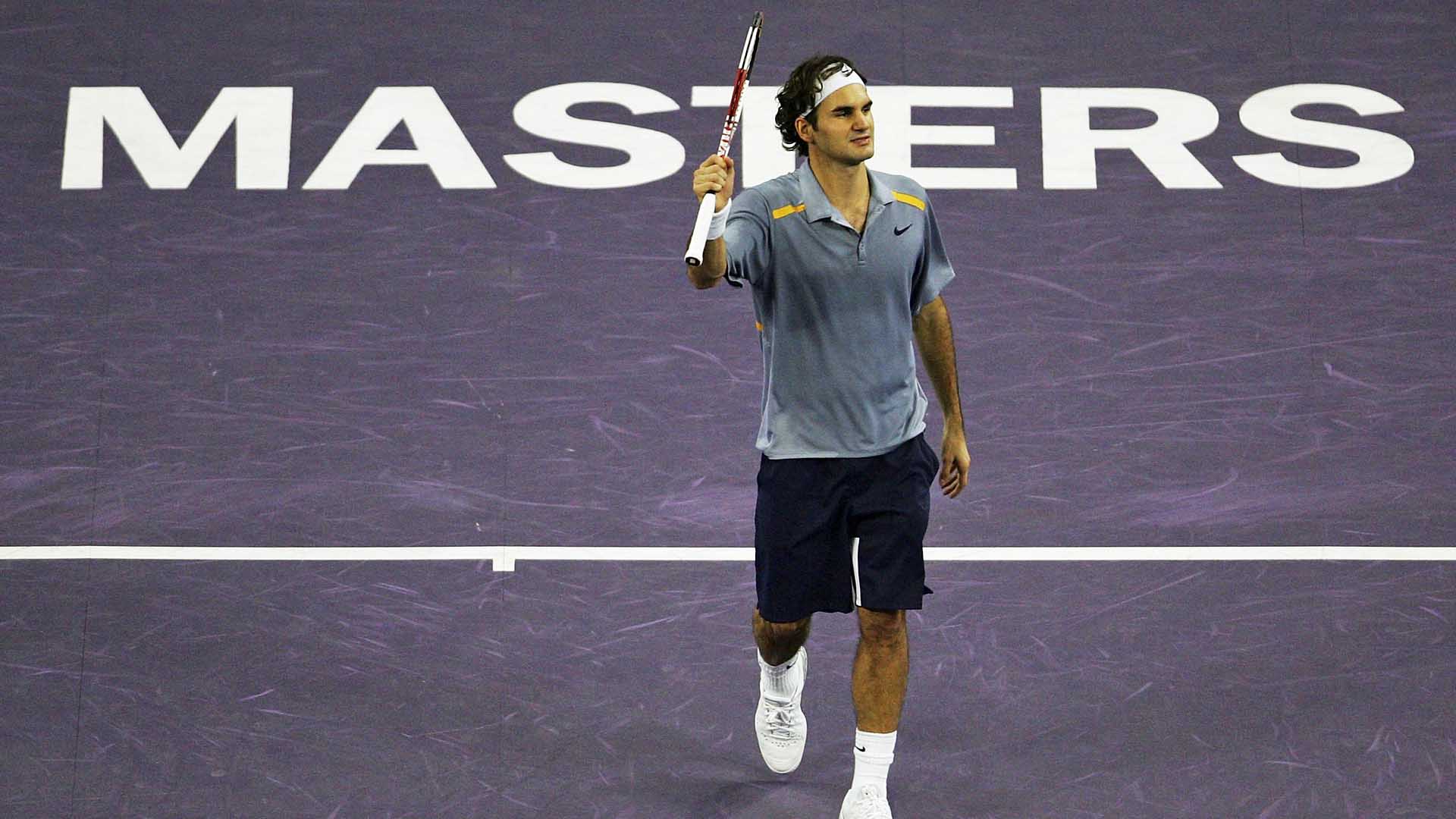
Six times Federer has won the season finale, including in 2006 in Shanghai. Photo by: Andrew Wong/Getty Images
2006
Win-Loss Record: 92-5 (94.84%)
Titles: 12
Grand Slam Titles: 3
FedEx ATP Rankings
The World No. 1 Federer only lost to two players during an imperious 2006 season: an on-the-rise Rafael Nadal (four times) and 19-year-old Andy Murray (once). He ended the year with a nearly untouchable winning percentage of 95 (92-5). Federer reached the final at all four Grand Slams and won three, as he added to his legend at the Australian Open (d. Baghdatis), Wimbledon (d. Nadal) and the US Open (d. Roddick).
He started 2006 on a 16-match win streak and finished the season winning 29 matches in a row, including a third Nitto ATP Finals title. That undefeated run would continue into 2007, and total a career-best 41 consecutive wins.
“I’ve run out of words [to describe] myself,” Federer joked after his 6-0, 6-3, 6-4 final win over James Blake in Shanghai. “I had to laugh at times today at how well I was playing. At this point in my career I’m so happy with my game.”
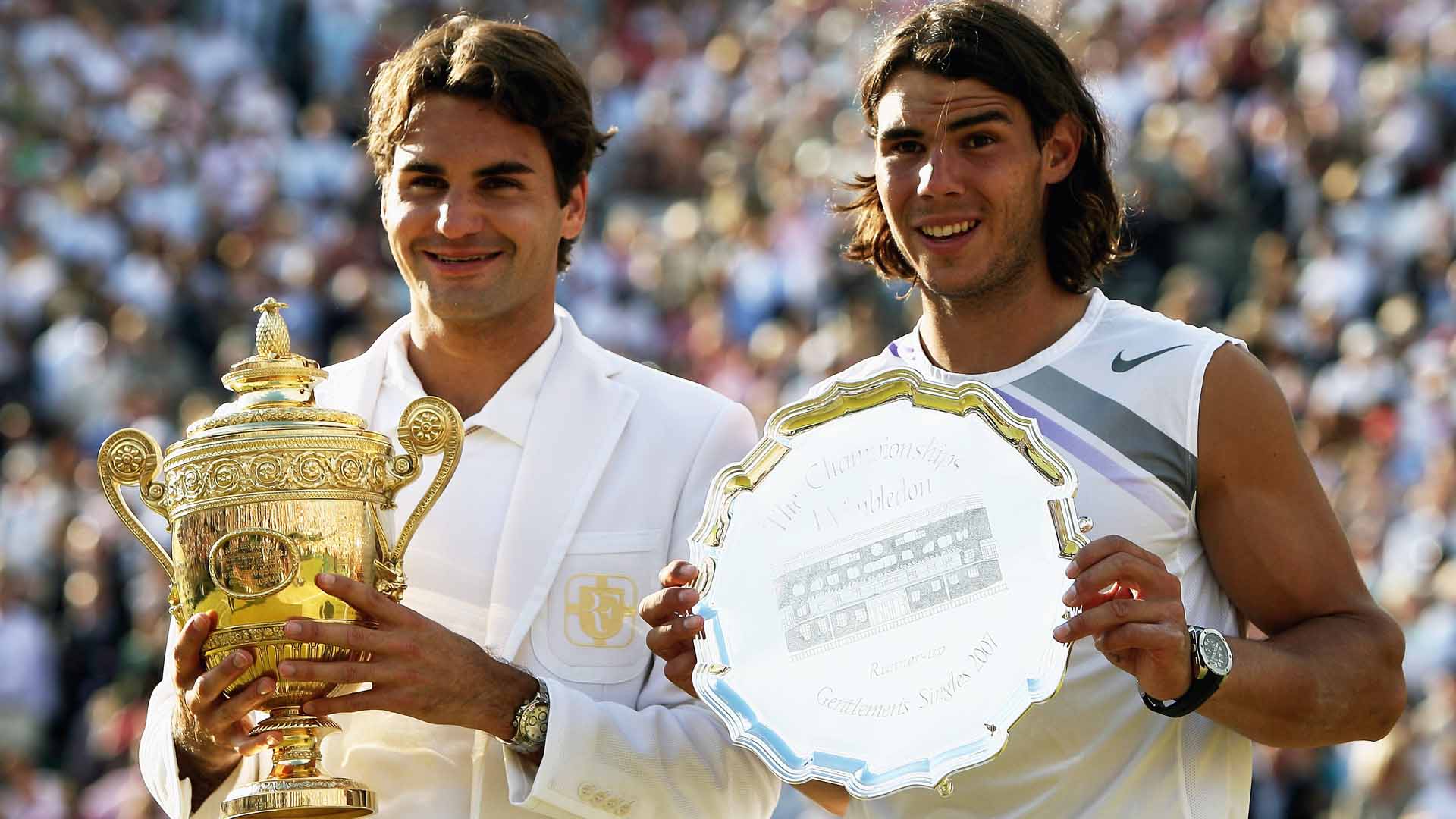
Federer claims his second consecutive Wimbledon final win over Rafael Nadal in 2007. Photo by: Clive Brunskill/Getty Images
2007
Win-Loss Record: 68-9 (88.3%)
Titles: 8
Grand Slam Titles: 3
For the second year in a row, Federer reached the finals at all four Grand Slams, winning three. He became the first player in history to win three majors in a year three times (2004, 2006, 2007) as he continued to fend off new faces and younger challengers.
Federer defeated Fernando Gonzalez at the Australian Open, Nadal at Wimbledon, and Novak Djokovic at the US Open. He also won the Nitto ATP Finals and two Masters 1000 titles in Hamburg and Cincinnati, an 88 per cent (68-9) win-loss record.
His 7-6(7), 4-6, 7-6(3), 2-6, 6-2 victory over Nadal at Wimbledon was an instant classic, and saw him equal Bjorn Borg’s record with his fifth consecutive championship at the All England Club. The feat also extended Federer’s grass-court winning streak to 55. He would rack up 65 wins in a row on the surface between 2003 and 2008, the longest grass-court streak in the Open Era.
All the while, Federer remained firmly at the top of the game. His 237 consecutive weeks at the top of the Pepperstone ATP Rankings (2004-2008) remains an ATP Tour record.

Mission accomplished! Federer completes the career Grand Slam at Roland Garros in 2009. Photo by: Ryan Pierse/Getty Images
2009
Win-Loss Record: 61-12 (83.6%)
Titles: 4
Grand Slam Titles: 2
After being denied in three previous Roland Garros finals, Federer finally completed the career Grand Slam with a victory over Robin Soderling in the final in Paris. He became just the sixth man in history to complete the career Grand Slam.
“This could be my biggest victory, the one that takes off the most pressure,” Federer quipped afterwards. “Now for the rest of my career, I can play relaxed and never hear again that I never won the French Open.”
A few weeks later, the Swiss once again made history as he lifted the Gentlemen’s Singles title once again, after defeating Andy Roddick in an epic five-set Wimbledon final. As Roddick held serve 37 times in a row, Federer finally broke through in the final game to win 5-7, 7-6(6), 7-6(5), 3-6, 16-14. It was Federer’s 15th Grand Slam singles triumph, breaking Pete Sampras’ all-time record.
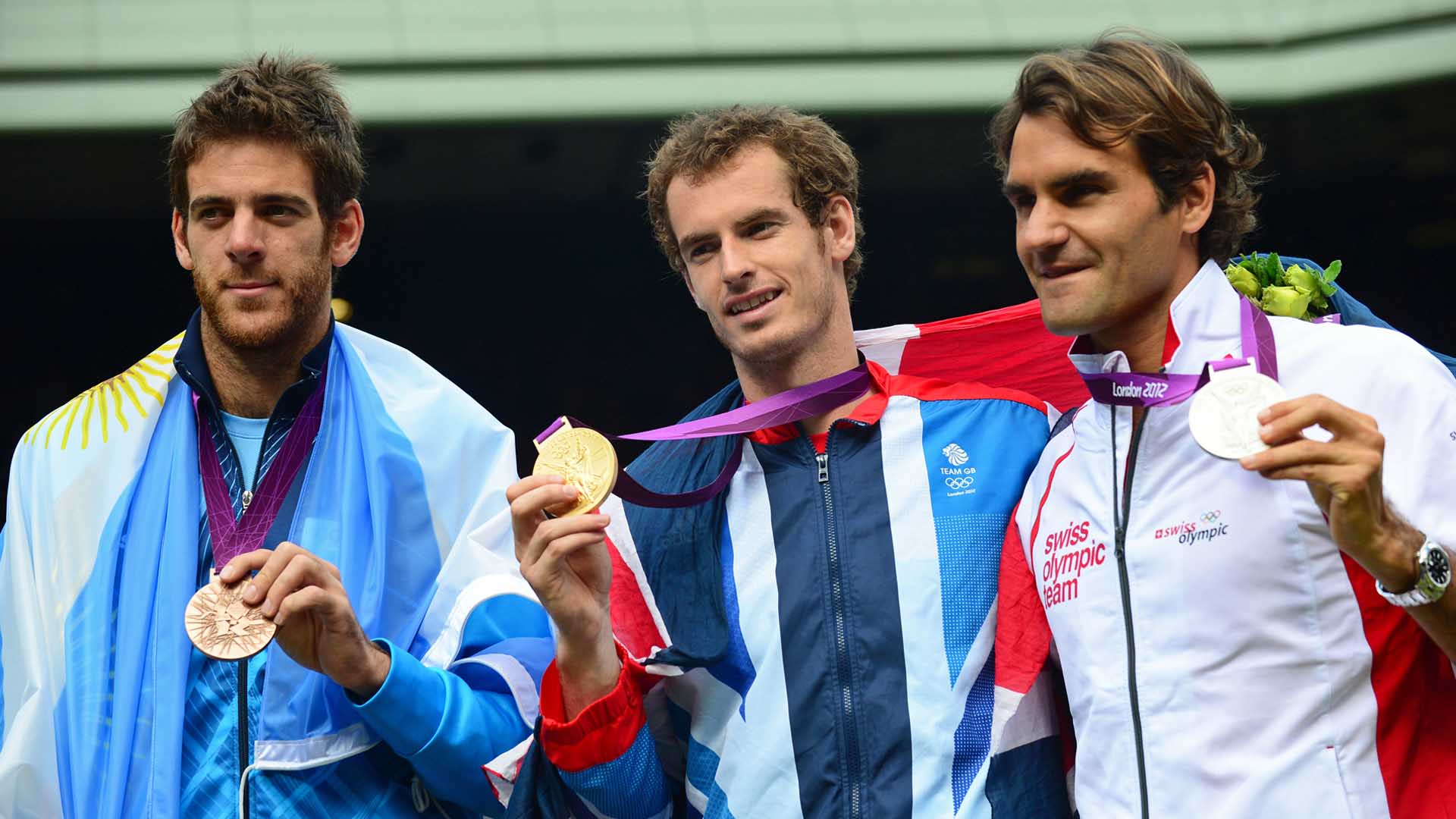
Federer adds singles silver at the London Olympics to the doubles gold he won in Beijing. Photo by: MARTIN BERNETTI/AFP/Getty Images
2012
Win-Loss Record: 71-12 (85.54%)
Titles: 6
Grand Slam Titles: 1
The 2012 season marked an emphatic return to form for Federer. He won 86 per cent (71-12) of the matches he played and won six tour-level titles – his best stats in half a decade.
Federer, who last won a major title in 2010, lifted his record-equalling seventh Gentlemen’s Singles trophy (d. Murray) – a record-extending 17th Grand Slam crown. In the process, he returned to World No. 1 in the Pepperstone ATP Rankings, a feat that tied (and ultimately surpassed) Pete Sampras’ record for weeks at No. 1 of 286. The Swiss would go on to tally 310 weeks in total over the course of his career.
A month later, he also clinched a silver medal at the 2012 London Olympics. After dropping the first set to Juan Martin del Potro in the semi-finals, Federer outlasted the Argentine in a marathon 3-6, 7-6(5), 19-17 comeback to reach the final (l. to Murray). It was Federer’s first medal in singles for Switzerland, after previously winning gold in doubles (w/ Wawrinka) at the 2008 Beijing Olympics.
“It’s been a great month. I won Wimbledon, became World No. 1 again, and I got silver,” he reflected. “I am very, very proud honestly to have won a silver. I had a very emotional tournament from start to finish.”
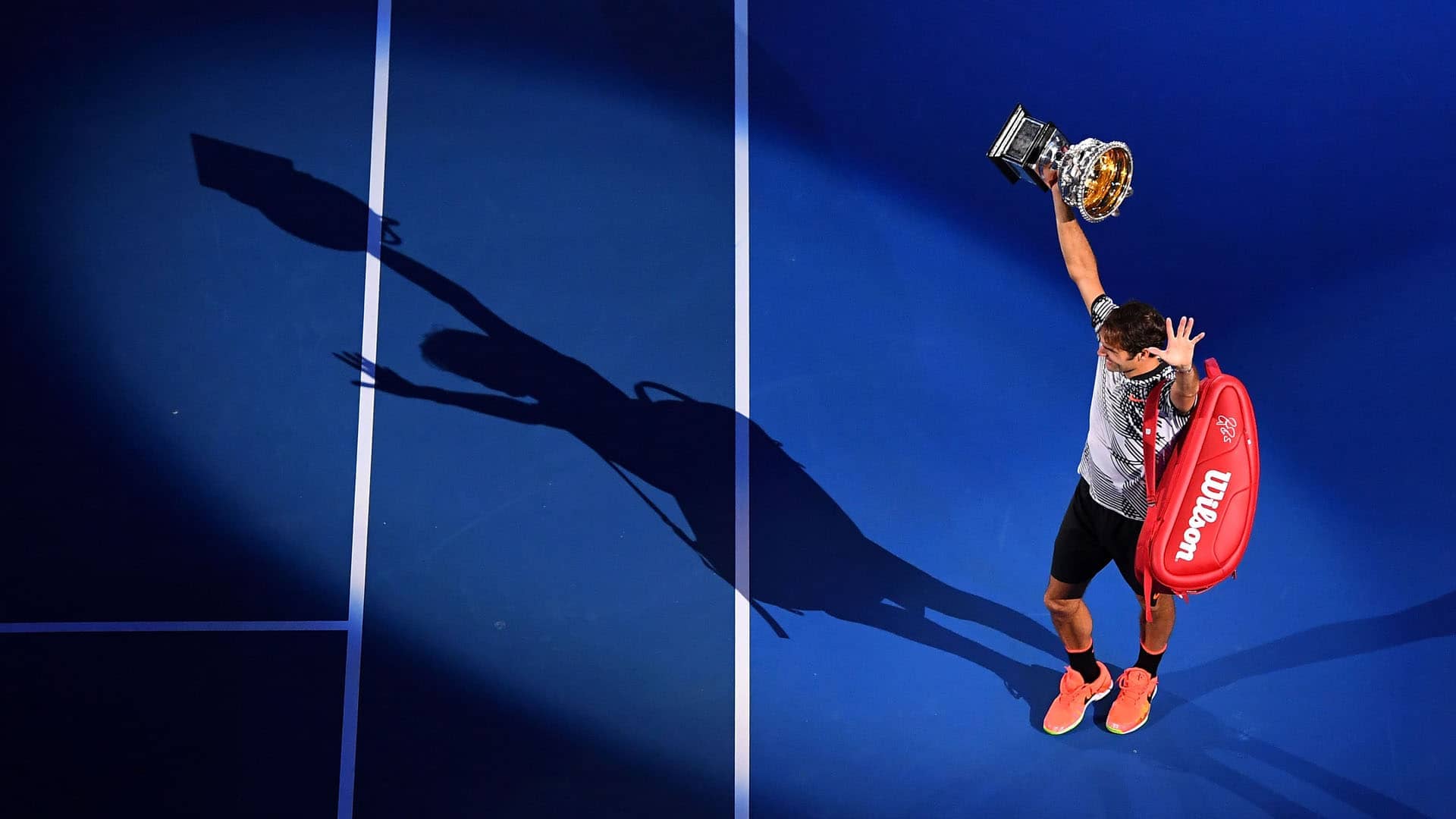
A remarkable comeback season in 2017 begins with the Australian Open title. Photo by: Quinn Rooney/Getty Images
2017
Win-Loss Record: 54-5 (91.5%)
Titles: 7
Grand Slam Titles: 2
With a revamped game, Federer embarked on one of the most impressive comeback seasons in tennis in 2017. At the age of 35, he won his first Grand Slam trophy since 2012 at the Australian Open after rallying from a break down in the fifth set against Nadal, 6-4, 3-6, 6-1, 3-6, 6-3. The win made him the oldest Slam champion since Ken Rosewall won there in 1972 at 37. At his beloved Wimbledon, Federer kicked things up a notch as he won his 19th Grand Slam title (d. Cilic) – and did so without dropping a set.
Federer didn’t stop there, and he would go on to claim seven titles in 2017, including three Masters 1000 wins at Indian Wells, Miami and Shanghai. It was the most trophies he had won in a decade, and he amassed a 92 per cent (54-5) win-loss record, his best percentage since 2006. After starting the season at No. 17 in the Pepperstone ATP Rankings due to a knee injury that sidelined him for much of 2016, Federer would finish 2017 at World No. 2.
“I knew I could do great again maybe one day, but not at this level. You would have laughed, too, if I told you I was going to win two Slams this year,” Federer said at Wimbledon. “People wouldn’t believe me if I said that. I also didn’t believe that I was going to win two this year.”

